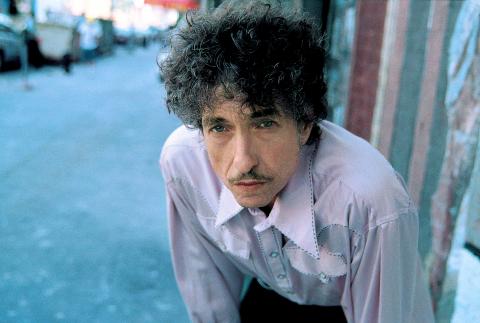He’s finally coming to Taiwan. Bob Dylan is scheduled to perform at the Taipei Arena (台北小巨蛋) on April 3.
Tickets go on sale at noon on Monday, according to the show’s promoter, Very Aspect Culture Group (有象文化), and will be available through books.com.tw and at all 7-Eleven ibon kiosks.
Rumors of a Dylan concert in Taiwan surfaced in 2005, when the American music icon and folk legend was supposedly considering an invitation by the former Taipei County Government (now the New Taipei City Government) to perform at the annual Ho Hai Yan Rock Festival (海洋音樂祭). Needless to say, it didn’t happen.

Photo Courtesy of Very Aspect Culture Group
Then last year was supposed to be Dylan’s debut appearance in Taiwan, as part of an Asian tour with dates in Beijing, Shanghai and Hong Kong.
But Dylan canceled the tour after China’s government denied him permission to perform there. The international media picked up on the story, with many outlets speculating that China’s Ministry of Culture was still reeling after Icelandic pop singer Bjork’s controversial 2008 concert in Shanghai, in which she shouted “Tibet! Tibet!” during her song Declare Independence.
After his Taipei concert, Dylan is scheduled to perform in Beijing, Shanghai and Hong Kong, according to the fan site boblinks.com, which is a nonofficial but well-established source for concert news and information on the singer.
And hopefully for fans, Chinese authorities will realize they have little to worry about with the 69-year-old rocker, who has long moved on from his folk-protest days and rarely engages in banter with the audience.
Not that his shows are lacking. Dylan, who plays an average of 100 concerts a year, is known for often recasting both old and new material with fresh arrangements, and for his top-notch backing band.
Taipei is the start of Dylan’s tour in Asia, which also includes shows in Vietnam, Singapore and Australia throughout April.

In the March 9 edition of the Taipei Times a piece by Ninon Godefroy ran with the headine “The quiet, gentle rhythm of Taiwan.” It started with the line “Taiwan is a small, humble place. There is no Eiffel Tower, no pyramids — no singular attraction that draws the world’s attention.” I laughed out loud at that. This was out of no disrespect for the author or the piece, which made some interesting analogies and good points about how both Din Tai Fung’s and Taiwan Semiconductor Manufacturing Co’s (TSMC, 台積電) meticulous attention to detail and quality are not quite up to

April 21 to April 27 Hsieh Er’s (謝娥) political fortunes were rising fast after she got out of jail and joined the Chinese Nationalist Party (KMT) in December 1945. Not only did she hold key positions in various committees, she was elected the only woman on the Taipei City Council and headed to Nanjing in 1946 as the sole Taiwanese female representative to the National Constituent Assembly. With the support of first lady Soong May-ling (宋美齡), she started the Taipei Women’s Association and Taiwan Provincial Women’s Association, where she

Chinese Nationalist Party (KMT) Chairman Eric Chu (朱立倫) hatched a bold plan to charge forward and seize the initiative when he held a protest in front of the Taipei City Prosecutors’ Office. Though risky, because illegal, its success would help tackle at least six problems facing both himself and the KMT. What he did not see coming was Taipei Mayor Chiang Wan-an (將萬安) tripping him up out of the gate. In spite of Chu being the most consequential and successful KMT chairman since the early 2010s — arguably saving the party from financial ruin and restoring its electoral viability —

It is one of the more remarkable facts of Taiwan history that it was never occupied or claimed by any of the numerous kingdoms of southern China — Han or otherwise — that lay just across the water from it. None of their brilliant ministers ever discovered that Taiwan was a “core interest” of the state whose annexation was “inevitable.” As Paul Kua notes in an excellent monograph laying out how the Portuguese gave Taiwan the name “Formosa,” the first Europeans to express an interest in occupying Taiwan were the Spanish. Tonio Andrade in his seminal work, How Taiwan Became Chinese,